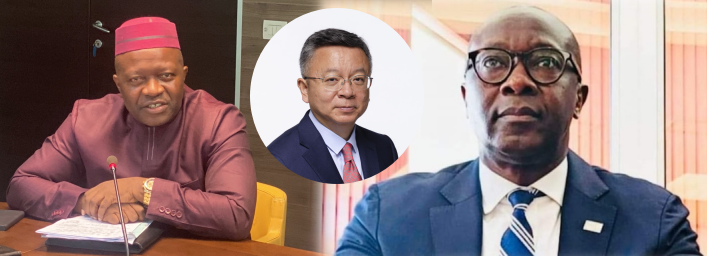
Monrovia – The International Monetary Fund (IMF) has downgraded Liberia’s economic growth forecast downward, cutting the 2025 projection to 4.6 percent from the government’s earlier estimate of 5.6 percent. The Fund urged the Liberian government to address persistent structural challenges, including limited competitiveness and widespread corruption.
By Gerald C. Koinyeneh, [email protected]
In its latest assessment, the IMF noted that while the medium-term outlook remains favorable—with growth projected to reach 5.4 percent in 2026 and stabilize at 5.5 percent thereafter—achieving these targets hinges on the full and timely implementation of the IMF-supported reform program under the Extended Credit Facility (ECF).
“Growth is projected at 4.6 percent in 2025 and 5.4 percent in 2026. Medium-term prospects remain favorable with GDP growth expected to stabilize at 5.5 percent, assuming full and timely implementation of the ECF-supported reform program,” the IMF said.
“Preserving fiscal consolidation, enhancing financial stability, and addressing key structural weaknesses—particularly limited competitiveness and widespread corruption—remain key challenges.”
The Fund’s review highlights ongoing concerns about institutional fragility and governance inefficiencies that continue to undermine economic progress, despite gains in macroeconomic stability in recent years.
Senator Konneh Warns of Fragile Economy, Persistent Corruption
Reacting to the IMF’s findings, Senator Amara Konneh, Chairman of the Senate Committee on Public Accounts and Audits, acknowledged Liberia’s economic fragility and warned that corruption and weak institutions remain major threats to sustainable growth.
“The reality is that our economy remains fragile and will stay that way as long as our institutions remain weak,” Senator Konneh said. “The Fund’s mention of ‘widespread corruption’ indicates that it will continue to hinder our growth, weaken investor confidence, and threaten our ability to achieve sustained, inclusive development.”
Konneh commended President Joseph Boakai and his Economic Management Team for securing IMF approval of SDR 19.3 million (about US$26.5 million) to support Liberia’s balance of payments but cautioned that structural weaknesses remain.
“Two years into the Boakai–Koung Administration, structural weaknesses persist, and low consumption highlights citizens’ limited buying power,” he said. “Both signal a weak economy, as shown by the IMF’s downgrade of Liberia’s 2025 growth forecast back to 2023 levels.”
While the 4.6 percent projection is an improvement from 2024’s 4.0 percent growth, Konneh described it as “slow progress” toward economic recovery and stressed that corruption remains the single biggest threat to sustained growth and investor confidence.
Structural Reforms Needed for AAID Success
Drawing from his experience as Finance Minister, Konneh attributed Liberia’s economic fragility to external pressures, limited professional capacity, and weak political will to implement reforms. He acknowledged progress in stabilizing the exchange rate and inflation but said deeper reforms are still needed.
He also criticized the government’s flagship Agenda for Inclusive Development (AAID), labeling it overly ambitious given fiscal constraints:
“Like the Poverty Reduction Strategy before it, the AAID—costing twice our GDP—is overly ambitious and requires strong institutions and real resources. Donor fatigue and inflationary pressures make resource mobilization more difficult than at any time in the past twenty years,” Konneh said.
The government has announced it would need US$8.3 billion over five years to achieve the AAID’s ambitious goals, with an average of US$1.6 billion needed each fiscal year. Experts warn that without proper mechanisms, these targets could remain unrealistic.
Konneh called for reforms to Liberia’s national budget, advocating a shift from heavy reliance on consumer taxes toward policies promoting job creation, fair redistribution, and protection of social spending.
He further warned that persistent corruption could jeopardize Liberia’s eligibility for a second Millennium Challenge Corporation (MCC) Compact:
“I do not believe the IMF’s mention of corruption will stop the MCC process, but continued failure to reform could weaken its impact,” he said.
Government Responds to IMF Approval, Not Forecast
The Ministry of Finance and Development Planning has yet to respond publicly to the IMF’s downgraded growth forecast. However, Minister Augustine Kpehe Ngafuan commended the Fund’s approval of SDR 19.3 million, calling it a vote of confidence in Liberia’s economic management during a period of declining overseas development assistance.
Ngafuan noted that the IMF review positions Liberia to potentially access additional funding in 2026 under the Resilience Sustainability Facility (RSF), aimed at helping countries improve resilience to climate-related vulnerabilities.
Despite the approval, economists caution that the IMF’s downgrade underscores the urgent need for governance reforms, stronger fiscal discipline, and an improved private sector environment to boost productivity, create jobs, and sustain investor confidence.
The IMF’s recommendations come as Liberia navigates post-pandemic recovery, rising inflationary pressures, and growing calls for accountability in public resource management.